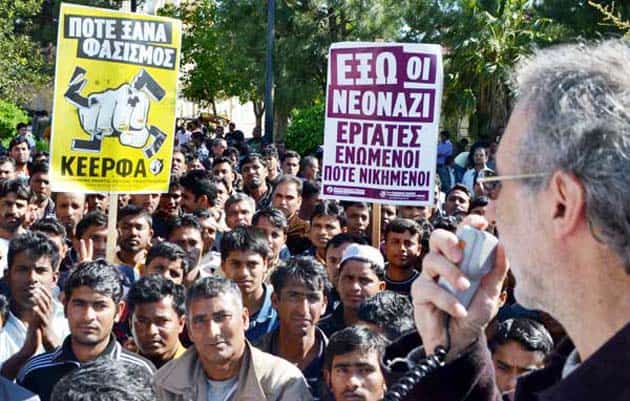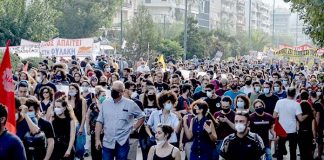Greek socialist Petros Constantinou spoke at Keep Left 2015 on the racism accompanying the economic crisis in Greece and how the left has organised to stop the rise of the fascist Golden Dawn. We reproduce his speech here.
In Greece, at the Macedonian border and around the Aegean Sea we have seen thousands of refugees trying to escape death especially from Syria, but also from Afghanistan, from Pakistan and African countries. All these people were confronted by the policies of Fortress Europe.
The whole policy of the EU is against the migrants and refugees, as they try to close the borders. They have a military operation in the Aegean sea, called Frontex, which means that there are airplanes and ships trying to stop the refugees entering Greece. The Greek coastguard are trying to push back the boats.
This meant that in the last years more than 3000 people drowned in the Aegean Sea, as well as others in the Mediterranean beyond the Italian coast.
All these policies of closing the borders meant death for the refugees.
These decisions were taken by the European Union. They decided to create detention centres, we call them concentration camps, and to form Frontex. But they also decided to crack down against the right of asylum. There was a law that gave the right to governments to imprison refugees for 18 months without trial if they entered “illegally”.
Racism was a card played by the government to scapegoat migrants and refugees, to avoid their responsibility for the capitalist crisis.
We can only understand the rise of Golden Dawn and the fascists by having in mind that the Greek ruling class was panicked.
In December 2008 the murder of a student, who was shot by a policeman in Athens, was met with the first revolt of the economic crisis.
Thousands were demonstrating for two months. Around Greece more than 150 police stations were destroyed by young people, especially schools kids who shut down their schools and demonstrated outside the police stations.
The ruling class responded to this with a double method: attacking the young people and also with racism. The government started its racist campaign by announcing the creation of the first concentration camps in Greece.
When the fascists appeared in that period, they were a tiny group. When they tried to make the first attempts to establish themselves in the streets of Athens, they got support from the police.
The Nazis tried to build on the racism coming from the government. The police captured 40 refugees and tortured them for days and nothing happened to stop them. They was an open co-operation with the fascists. The fascists tried to build a movement against the refugees, calling demonstrations against “illegal immigration”.
Of course this met resistance. There was an anti-racist and anti-fascist movement from the first moment they tried to build a base.
The KEERFA movement was created in 2009 when, in the first period of crisis, the party attracting the anti-immigrant vote was Laos. Golden Dawn was still a marginal political force.
We can understand the rise of the fascists only by having in mind that the austerity package was a huge attack against the working class, but was accompanied with racism in an effort to divide workers.
We can only understand the rise of the Nazis by understanding the political crisis, and the meltdown of the traditional ruling class parties, the social democrats of Pasok and the neo-liberals of New Democracy, whose vote collapsed.
The Nazis of Golden Dawn made their big breakthrough in 2010, when they were elected in the Athens municipal authority with a 5 per cent vote. But there was not a clear shift to the right, the shift was mainly to the left but there was polarisation.
The Nazis tried to build from the anger against austerity to argue the problems in unemployment, social services and so on were created by the mass influx of immigration. They used racist arguments that the migrants were bringing criminality and diseases like malaria.
In 2010 Laos participated in a national coalition government with New Democracy and Pasok supporting the austerity measures.
This opened the space for Golden Dawn, who presented themselves as against the international bankers and the austerity package. From 2010 to 2012 they tried to build a mass movement.
Fascism
When we speak about fascists we’re not speaking about just a far right group who support racism, the crucial difference is they tried to build a mass reactionary movement in the streets to impose terror on the neighbourhoods.
Golden Dawn were attacking regularly migrants in the centre of Athens with the support of the police. Thousands of migrants were beaten.
An escalation came in 2012 when they finally managed to enter parliament with 7 per cent and they tried to build on this.
It was terrifying to see half a million people vote for a Nazi party, but this was against a background of a huge left turn in Greece.
New Democracy and Pasok lost 40 to 50 per cent of their vote but most of this went to the left. This was the period where Syriza rose to almost 30 per cent.
We argued that you can stop the Nazis by the united front tactic. We argued to build a mass movement to confront the Nazis, to prevent them organising attacks against immigrants, to prevent them opening offices and pretending that they are a party like the other parties. We said this is a Nazi gang and we have to stop them everywhere by mobilising the organised forces of the workers’ movement on the streets.
It was a very threatening situation, but thousands mobilised in the neighbourhoods and the Nazis were isolated. They couldn’t build in areas where they didn’t have the support of the police. They never mobilised more than 500 people.
The vote for Golden Dawn was not 100 per cent a Nazi vote. They got three kind of votes: one was a clear far right vote, it was the smallest part, coming from the tradition of the Nazi collaborators in Greece in the 1940s and the supporters of the military dictatorship of 1967-74. Secondly were also the voters coming from the collapse of the right-wing populist party, Laos.
And the third and biggest section came as a product of the political crisis where people voted for a whole range of parties including the left.
Mass resistance
The mobilisations were very strong whenever they tried to build a racist campaign.
In 2012-13 they went to Pakistani shopkeepers and said you have one week to close down your shops and go back to your country.
But in that week we formed a united front locally from the social democrats to the anarchists. Keerfa was central in this. More than 3000 mobilised and we stopped them repeatedly in that area.
They tried to move from central Athens where they had the support of the police to other areas. And they lost. After that they became more violent and in 2013 they attacked trade unionists from the Communist Party and injured more than 40 of them. The trade unionists were putting up posters for a festival and they sent them to hospital.
The next week they murdered Pavlos Fyssas the musician.
This was met with mass resistance: we had a general strike against the nazis and a huge demonstration of 50,000 marching to the headquarters of Golden Dawn.
This forced the government to move for a crackdown and they ended up in prison. Half of the parliamentary group was in prison for 18 months. Now they are on trial.
They are still a threat. Their trial is crucial because there is a tradition of the courts clearing right-wing figures.
Isolating the fascists
We say they are not a political party, they are a Nazi gang and should be in prison forever.
We call on the workers movement and the left not to give them a platform but to isolate them in parliament and the municipal authorises and so on.
We ask the Ministers not to answer their questions in parliament. Unfortunately the Syriza government doesn’t have a good record on that. The Minister of Immigration was answering the racist questions of the Nazi MPs.
The President of the parliament, who was against austerity and resisted the shift to the right of Syriza, argued that the Golden Dawn MPs who were in prison should be allowed to go to parliament to vote otherwise the parliament was not democratic. Fortunately she was not supported by the parliamentary group of Syriza.
Syriza adapted to the pressure of the racists, putting severe restrictions on the right to citizenship of the children of migrants, arguing that children born in Greece can get citizenship only when both parents are legal and only when a child has been born in Greece 12 years after their parents became legal, and also have a successful education in Greek schools. They didn’t close down the detention centres even though there was huge pressure.
It’s very important to fight against the fascists of Golden Dawn, to stop them presenting themselves as an opposition to the memorandum and it was very crucial what we did as an anti-fascist movement during the Oxi campaign in the referendum.
The campaign for “No” was organised by the left and we didn’t give any space for them to appear in the demonstrations in the streets of Athens. So it was very clear that the “No” vote was a success of the left against the right. The Nazis were absolutely isolated.
In front of us we have huge duties. In order to keep the space open for an anti-capitalist left solution we have to stop the Nazis.
We have to smash the racists and to keep the left turn going. We are very optimistic that we can.





